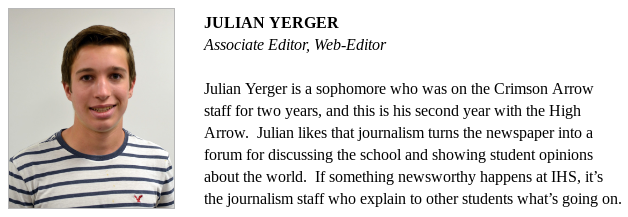By INDIA KRUG and JULIAN YERGER
POINT: The Repercussions of Celebrating Columbus Day
By INDIA KRUG – As Americans, it is common for us to idealize holidays. We place colder month festivities such as Thanksgiving atop pedestals, choosing to celebrate a crystallized vision of how we perceive that our culture comfortably fits within these events.
And as our children come home with their paper Pilgrim hats and drawings of colonists helping Native Americans cut a turkey around a table, we unknowingly progress the line of appropriation. But the truth is, our rose-colored glasses can only protect us from so much.
A federal government holiday, Columbus Day, has seemly slipped under the radar since it was established in 1937. Recently, a new wave of criticism has emerged, branding the day as a celebration of an enslaver, murderer, and aide in the devastation of the Native American population. As students at IHS, it is primarily noteworthy because we get to miss school. But it leaves a question to be asked: What purpose does Columbus Day serve?
For that answer, we must look to Italophobia or the discrimination of Italian immigrants. At the turn of 19th century, Italian Catholics were the bearers of much of the country’s hostility which was intensified after the lynching of nine Italian immigrants in New Orleans in 1891. Columbus Day was implemented less than half a century later as a way to honor the Italian heritage and limit prejudice.
However, it seems that this holiday has outlived its intended purpose. Since then, the Italian community has grown nearly four times its size, with almost 17 million Italian Americans living in the country today. October was named Italian Heritage Month, with festivities on a local and national level.
But those who celebrate Christopher Columbus solely on his background are overlooking many viable candidates to celebrate instead, such as Enrico Bernardi (1841-1919), a pioneer of the Italian automobile industry and inventor of the first petrol engine. Or Francesca Caccini (1587-1641), the first woman to compose opera; or Leonardo da Vinci (1452-1519), a polymath and leader of the Italian Renaissance, credited for works such as the Mona Lisa (1503) and The Last Supper (1498).
Columbus, unlike Leonardo da Vinci, was exceptionally brutal, even by 15th century standards. He wanted to enslave the entire Native population in order colonize more effectively and was sent back to Spain in chains for governing too harshly.
This brings up the issue of our values as a society. We still hold onto many outdated traditions and figureheads, shown by the recent conflicts arising from the eradication of Confederate statues. But one thing is certain: our history does not disappear after a statue is removed or a holiday is no longer celebrated.
It’s not as if the Civil War ceases to exist when a bust of Robert E. Lee is taken down, or a halt on Columbus Day festivities causes Columbus’ name to be stripped from the minds of Americans. But there is a difference in acknowledging someone’s actions and honoring them.
Refraining from celebrating Columbus Day should not be an alienating act. It is a decision to not immortalize a man whose legacy is controversial. For generations, there have been claims that Columbus Day is meant to praise the exploration and civilization of this country, and for generations, few have addressed the elephant in the room.
We are excusing a maligned man’s actions under the guise of Patriotism. Senior Skylar Pruett says, “It [Columbus Day] idolizes someone who’s entire career benefited from the suffering of Native Americans.”
Over sixty U.S. cities have transitioned from Columbus Day to Indigenous Peoples’ Day, claiming that instead of celebrating the arrival of Europeans to America, one should commemorate the spirit of Indigenous peoples who protected their families and heritage while enduring a long string of violence and disease.
Sophomore Lily Boulard says, “If you want to celebrate a holiday that has to do with someone coming to the United States, you should celebrate the native people coming here because they were the real ‘first people.’”
The undertones of this holiday outweigh its intentions, whatever they may be. Are we going to applaud exploration through the celebration of a man who believed he discovered India? Are we going to spend one of our ten federal holidays memorializing the desolation of nearly 97% of the Native American race, beginning with the first European who set foot on this continent? The choice is ours.

COUNTERPOINT: Reclaiming Columbus Day
By JULIAN YERGER – A few weeks ago, another Columbus Day came and went, accompanied by protests across the nation. This battered holiday used to be widely celebrated, but in recent decades, a social movement has sought to demonize early explorers of the new world.
While no one disputes the damage Native Americans suffered after European settlers arrived, these natives weren’t as innocent as many prefer to portray them, and while they’re getting blamed for the crimes of others, the heroism of these early explorers is often overlooked. Every second Monday of October, students miss school to honor the Columbus for establishing a transatlantic partnership that spread the ideas of science, mass democracy, and the protection of human rights.
For this era of European history, countries were ruled by an entrenched elite of families, and people almost always lived and died within their social class. Born to a middle-class weaver, Columbus exemplified an idea of hard work and personal advancement that would later be called “The American Dream.” He went to sea at the age of ten, fighting his first naval battle at nineteen. His brother was a cartographer, and as he learned the art of navigation, Columbus developed his own ideas about the shape of the world.
In his day, most scholars thought that the known world only consisted of Africa and Eurasia with a massive ocean spanning the other half the globe. However, not much was known about the reclusive nation of Japan, so Columbus thought a string of islands could continue around the world to Europe. He miscalculated the diameter of the Earth to show it would be a short trip, causing many to doubt him. “I think that he wasn’t that successful so we shouldn’t be celebrating him,” said IHS Senior Giaco Gentile. Nevertheless, Columbus drew detailed maps and convinced the Spanish crown to lend money for an expedition to prove this, establishing the first European settlement in the New World.
Although Columbus Day has recently come under attack, it has long been honored as a patriotic day, and the World’s Columbian Exposition was held in 1893 to remember America’s unique heritage as a nation of immigrants, a tradition that began with Columbus.
For some, the festivities are overshadowed by the European diseases that decimated Native American populations. However, it’s worth remembering that many New World diseases flowed to the Old, and at this same time, a syphilis outbreak in Europe killed 5 million people. When the adventures of Marco Polo had opened trade routes to the Far East centuries before, it wasn’t long before the Black Death came to Europe and killed 75 million to 200 million people.
Disease outbreaks are a natural consequence of the advancement of civilization, and it’s undeniable that contact between these continents caused tremendous advances. “It’s understandable that people would oppose him, but without Columbus, democracy and the Western world wouldn’t be as developed as they are today,” IHS Senior Isaac Evans said.
Columbus has been accused of governing harshly, but he was leading a skeptical crew beyond the boundaries of the known world. Many sailors didn’t buy into Columbus’s ideas, so tight discipline was needed to prevent a mutiny. In the Jamestown colony a century later, settlers struggled with a lack of order, and the colony nearly collapsed in confusion.
Columbus Day was also created to honor the heritage of Italian Americans and our first multicultural hero. Many agree that the holiday has outlived this original purpose, but the recent movement to stop Columbus day has anti-Italian undertones. Most of the anti-Native American events protested by the movement were not caused by Columbus or other southern European Catholics, but by later settlers from different nations. The Walking Purchase, Trail of Tears, and Seminole wars were all committed by English settlers and later the United States, a nation of Protestants from northern Europe. It’s worth noting that during this time period, the French traded with natives, the Spanish intermarried with them, but the English pushed them off their land and killed them. Columbus shouldn’t serve as a scapegoat for American Expansionism
This recent movement also whitewashes Native American history, trying to portray them as noble savages living on a virgin continent. Aztec and Mayan civilizations in Central America subjected nearby tribes and slaughtered their tributes because their god demanded regular sacrifice of human hearts. In South America, the Incas preferred to sacrifice young children because they were the “purest humans.” In North America, Indian tribes fought “mourning wars” where they would raid an enemy village, torture all the men and older boys, and enslave everyone else to bolster their own population. All this came at a time when Europeans had a highly civilized code of warfare to limit civilian casualties.
Columbus day should still be celebrated because he was an incredible explorer whose morals were justified within his own time period.

[Photo by India Krug]
Photo Caption: “Sophomore Cecilia Sobolewski reads a history textbook article about North America’s Indigenous peoples.”

